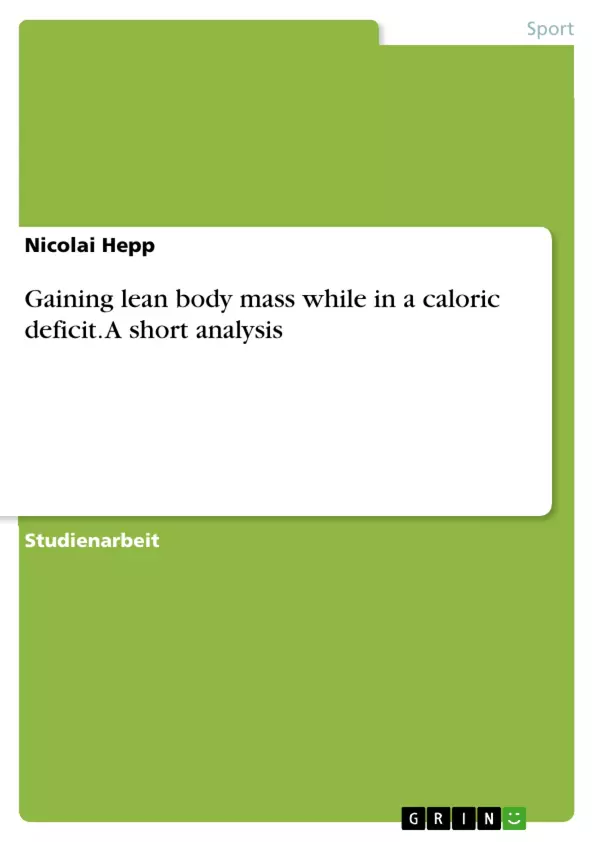This paper deals with the question, whether it is possible to gain lean body mass while in a negative energy balance.
The most important aspect in respect to weight management is energy balance. If the energy balance and thus the relationship between calorie uptake and expenditure is negative, weight-loss is induced. Is the energy balance and therefore the relationship between calorie uptake and expenditure positive, overall weight-gain is induced.
The energy the human body uses is commonly measured in calories. That’s why energy balance can also be described as calorie balance. In the scientific literature it is recommended to maintain a moderate caloric surplus (positive energy balance) in order to build lean body mass efficiently. Alongside the favored caloric surplus a well-rounded strength training regimen should be incorporated. Although lean body mass is preferably gained in a caloric surplus, the question whether or not lean body mass can be gained while in a caloric deficit arises nevertheless.
Inhaltsverzeichnis
- Introduction
- Gaining lean body mass while in a caloric deficit
- Garthe, I. et al., (2011)
- Mettler, S. et al., (2010)
- Dudgeon, W. et al., (2015)
- Discussion
Zielsetzung und Themenschwerpunkte
Die Arbeit untersucht die Möglichkeit, während eines Kaloriendefizits Muskelmasse aufzubauen. Ziel ist es, die Bedingungen und Faktoren zu beleuchten, die diesen Prozess beeinflussen.
- Der Einfluss verschiedener Kaloriendefizit-Grade auf den Muskelaufbau
- Die Rolle der Makronährstoffzusammensetzung (insbesondere Protein)
- Die Bedeutung von Krafttraining für den Erhalt und den Aufbau von Muskelmasse im Kaloriendefizit
- Die Auswirkungen von Protein-Supplementation
- Der Einfluss des Trainingsstatus auf den Erfolg
Zusammenfassung der Kapitel
Introduction: Die Einleitung stellt den Zusammenhang zwischen Energiebilanz und Gewichtsmanagement her. Sie erklärt, dass ein Kalorienüberschuss normalerweise für den Muskelaufbau empfohlen wird, hebt aber die Forschungsfrage nach der Möglichkeit des Muskelaufbaus im Kaloriendefizit hervor.
Gaining lean body mass while in a caloric deficit: Dieses Kapitel präsentiert und analysiert drei Studien zum Thema Muskelaufbau im Kaloriendefizit. Die Studie von Garthe et al. (2011) zeigt, dass ein langsameres Gewichtsverlusttempo den Erhalt oder sogar den Aufbau von Muskelmasse begünstigt. Mettler et al. (2010) betonen die Bedeutung einer proteinreichen Ernährung für den Muskelerhalt während einer Kalorienrestriktion. Die Studie von Dudgeon et al. (2015) unterstreicht den positiven Effekt von Whey-Protein-Supplementation vor und nach dem Training auf den Erhalt von Muskelmasse im Kaloriendefizit.
Discussion: Die Diskussion analysiert kritische Punkte der präsentierten Studien. Es werden beispielsweise die unterschiedlichen Interventionslängen in der Garthe-Studie und die Trainingsintensität in der Dudgeon-Studie als potenzielle Einflussfaktoren diskutiert. Die Diskussion legt nahe, dass ein intensiveres und häufigeres Training den Muskelaufbau im Kaloriendefizit weiter fördern könnte.
Schlüsselwörter
Muskelaufbau, Kaloriendefizit, Energiebilanz, Protein, Krafttraining, Protein-Supplementation, Gewichtsmanagement, Makronährstoffe, Studienanalyse.
Häufig gestellte Fragen zu: Muskelaufbau im Kaloriendefizit
Was ist das Thema dieser Arbeit?
Die Arbeit untersucht die Möglichkeit, Muskelmasse während eines Kaloriendefizits aufzubauen. Sie analysiert die Bedingungen und Faktoren, die diesen Prozess beeinflussen.
Welche Studien werden in der Arbeit analysiert?
Die Arbeit analysiert drei Studien: Garthe et al. (2011), Mettler et al. (2010) und Dudgeon et al. (2015). Diese Studien untersuchen den Einfluss verschiedener Faktoren auf den Muskelaufbau im Kaloriendefizit.
Was sind die zentralen Themen der Arbeit?
Zentrale Themen sind der Einfluss des Kaloriendefizit-Grades, die Rolle der Makronährstoffe (insbesondere Protein), die Bedeutung von Krafttraining, die Auswirkungen von Protein-Supplementation und der Einfluss des Trainingsstatus auf den Muskelaufbau im Kaloriendefizit.
Was sind die wichtigsten Ergebnisse der analysierten Studien?
Garthe et al. (2011) zeigen, dass langsamerer Gewichtsverlust den Muskelaufbau begünstigt. Mettler et al. (2010) betonen die Bedeutung einer proteinreichen Ernährung. Dudgeon et al. (2015) unterstreichen den positiven Effekt von Whey-Protein-Supplementation.
Welche Faktoren beeinflussen den Muskelaufbau im Kaloriendefizit laut der Arbeit?
Laut der Arbeit beeinflussen Faktoren wie der Grad des Kaloriendefizits, die Proteinzufuhr, die Intensität und Häufigkeit des Krafttrainings, die Protein-Supplementation und der Trainingsstatus den Muskelaufbau im Kaloriendefizit.
Wie wird die Diskussion der Studien in der Arbeit gestaltet?
Die Diskussion analysiert kritische Punkte der präsentierten Studien, wie z.B. unterschiedliche Interventionslängen und Trainingsintensitäten. Sie legt nahe, dass intensiveres und häufigeres Training den Muskelaufbau fördern könnte.
Welche Schlüsselwörter beschreiben die Arbeit?
Schlüsselwörter sind: Muskelaufbau, Kaloriendefizit, Energiebilanz, Protein, Krafttraining, Protein-Supplementation, Gewichtsmanagement, Makronährstoffe, Studienanalyse.
Wie ist die Arbeit strukturiert?
Die Arbeit beinhaltet eine Einleitung, ein Kapitel zum Muskelaufbau im Kaloriendefizit (mit Analyse der drei Studien), und eine Diskussion der Ergebnisse. Zusätzlich enthält sie ein Inhaltsverzeichnis, die Zielsetzung und Themenschwerpunkte sowie eine Zusammenfassung der Kapitel und Schlüsselwörter.
- Citation du texte
- Nicolai Hepp (Auteur), 2018, Gaining lean body mass while in a caloric deficit. A short analysis, Munich, GRIN Verlag, https://www.grin.com/document/1002966



